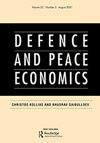分担混合威胁的负担:来自联盟经济学的教训
IF 1.6
3区 经济学
Q2 ECONOMICS
引用次数: 3
摘要
摘要本文探讨了不断变化的(混合)冲突环境对负担分担辩论的影响。我们讨论了联盟作为成员国在抵制这些威胁时所采取的行动,认为这主要产生了私人或不纯公共的安全产出。由于负担分担文献目前缺乏混合威胁的概念,我们认为目前的模型不适合对成员国的负担分担行为提供可靠的评估。我们通过调整联合产品模式来解决这一空白,将一个国家的安全活动扩展到更具包容性的“政府整体(WoG)方法”。我们从WoG模式出发,强调比较成员国在应对这些威胁方面的贡献所带来的挑战。这导致我们对使用总军事开支作为衡量一个国家搭便车程度的主要变量提出异议。应考虑更多和其他类型的(非军事)变量和代理指标。在这种永久性非线性状态竞争的框架内估计利益-负担一致性也是如此。本文章由计算机程序翻译,如有差异,请以英文原文为准。
Sharing the Burden of Hybrid Threats: Lessons from the Economics of Alliances
ABSTRACT This article discusses the effects of the changing (hybrid) conflict environment on the burden sharing debate. We discuss the actions taken by both the alliance as the member states in repelling these threats, arguing that this mainly produces security outputs that are private or impure public. As the burden sharing literature currently lacks notions of hybrid threats, we believe the current modelling to be ill-suited to provide reliable assessments of member states’ burden sharing behaviour. We address this void by adjusting the Joint Product Model, extending a country’s security activities to a more inclusive ‘whole of government (WoG) approach’. We depart from this WoG model to stress the challenges associated with comparing the contributions of member states in countering these threats. This leads us to dispute the use of aggregate military expenditures as a main variable to measure a country’s degree of free riding. More and other types of (non-military) variables and proxy-indexes should be taken into account. The same remark goes for estimating the benefit-burden concordance within this framework of permanent non-linear state competition.
求助全文
通过发布文献求助,成功后即可免费获取论文全文。
去求助
来源期刊

Defence and Peace Economics
ECONOMICS-
CiteScore
4.00
自引率
18.80%
发文量
45
期刊介绍:
Defence and Peace Economics embraces all aspects of the economics of defence, disarmament, conversion and peace. Examples include the study of alliances and burden-sharing; military spending in developed and developing nations; arms races; terrorism; country surveys; the impact of disarmament on employment and unemployment; the prospects for conversion and the role of public policy in assisting the transition; the costs and benefits of arms control regimes; the arms trade; economic sanctions; the role of the United Nations.
 求助内容:
求助内容: 应助结果提醒方式:
应助结果提醒方式:


